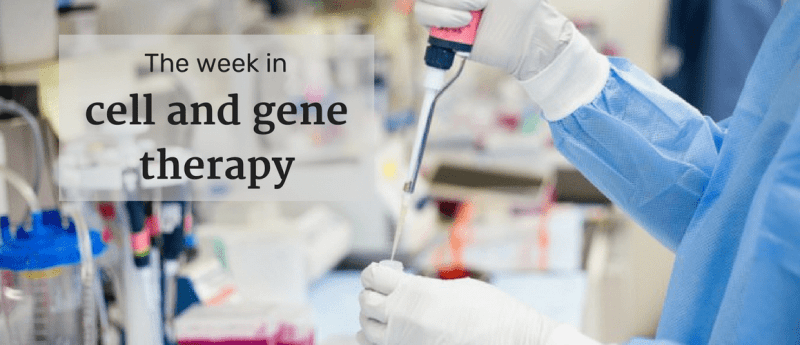Cell therapy weekly: Bioethical framework for therapeutic gene editing released

FDA guidance to progress marketing of stem cell-based therapy for heart failure, Fast Track Designation for degenerative disc disease cell therapy and novel stem cell spheres for skin wound healing.
The news highlights:
Bioethical framework for therapeutic gene editing uses released
FDA guidance to progress marketing of allogeneic stem cell therapy for heart failure
FDA Fast Track Designation awarded for degenerative disc disease cell therapy
Novel stem cell spheres for the treatment of skin wounds
New research sheds light on natural killer cell mechanism of action
Bioethical framework for therapeutic gene editing uses released
Alliance for Regenerative Medicine (DC, USA), the international advocacy association for the regenerative medicine community, has issued a Therapeutic Developers’ statement outlining five key, bioethical principles concerning therapeutic gene editing uses. These include endorsing the investigation of therapeutic applications of somatic cell gene editing and asserting that germline gene editing is currently inappropriate in human clinical settings. The framework has been signed by 13 notable regenerative medicine therapeutic developers who routinely employ gene editing technology, including bluebird bio (MA, USA) and CRISPR Therapeutics (Zug, Switzerland).
Janet Lambert, ARM CEO ARM, commented: “These [gene editing] techniques will be integral to the next generation of advanced therapeutics…As with all breakthrough biotechnologies, we need to exercise caution and good stewardship in our research and development practices and ensure that work involving the genetic modification of cells takes place within the bioethical framework outlined in these principles.”
FDA guidance to progress marketing of allogeneic stem cell therapy for heart failure
Mesoblast (Melbourne, Australia) has received FDA guidance concerning how they may progress towards successful marketing approval for Revascor — their novel, allogeneic stem cell therapy for the treatment of end-stage heart failure in patients with left ventricular assist device (LVAD) implants. Revascor, currently being developed under existing FDA Regenerative Medicine Advanced Therapy (RMAT) and Orphan Drug Designations, was found to be effective at reducing major mucosal bleeding events in a placebo-controlled clinical trial of 159 heart failure patients with LVADs. The FDA has agreed on a confirmatory Phase III trial for Revascor use in this patient population, to be conducted at the International Center for Health Outcomes Innovation Research (InCHOIR) within the Mount Sinai Icahn School of Medicine (NY, USA).
Silviu Itescu, Chief Executive of Mesoblast, commented: “The FDA guidance on the pathway to registration for our heart failure product candidate in LVAD patients is a major step forward for our cardiovascular program. We will work closely with the FDA and InCHOIR to generate the confirmatory clinical data needed for full marketing approval of Revascor in the prevention of this life-threatening inflammatory complication of an LVAD implant in end-stage heart failure patients.”
FDA Fast Track Designation awarded for degenerative disc disease cell therapy
DiscGenics (UT, USA), a biotechnology company that specializes in clinical-stage, analgesic cell therapies for degenerative disc disease (DDD), has been awarded FDA Fast Track Designation for its novel therapy IDCT. The pain-relieving effectiveness of IDCT is currently being evaluated in clinical trials in the USA and Japan.
Flagg Flanagan, Chairman and CEO of DiscGenics, stated: “We are thrilled to receive Fast Track designation for IDCT as it recognizes the extremely compelling preclinical and safety data we have generated for IDCT through our robust research and development and clinical programs…This Fast Track designation reinforces our commitment to working with regulators to identify ways to accelerate development and expedite approval of the therapy within existing regulatory frameworks to make IDCT available to patients as quickly as possible.”
What is the FDA’s Fast Track Designation?
Fast Track Designation, which can only be applied for and/or granted following substantive demonstration that a product may be able to treat a specified disease, confers manufacturer benefits such as early and frequent FDA guidance, and Accelerated Approval and Priority Review program eligibilities.
Novel stem cell spheres for the treatment of skin wounds
For the first time, researchers from the University of Macau (China) have been able to topically apply stem cells for wound healing. The team developed and applied novel ‘stem cell spheres’ directly to the skin surface of excised wounds in mice. The spheres were demonstrated efficient at wound healing and more robust and capable of successful skin penetration compared with conventional, dissociated cell therapy routes of administration.
In the study, published in Theranostics, the authors conclude that their data “…suggest the topical application of EMSCSp (embryonic stem cell-derived, mesenchymal stem cell spheres) as an unlimited, quality-assured, safe, and noninvasive therapy for wound healing…”
New research sheds light on natural killer cell mechanism of action
A Norwegian team has found the natural killer (NK) cells learn to respond to danger through modulation of the lysosomal compartment under the influence of inhibitory receptor—ligand interactions. NK cells, which can kill tumor or other unwelcome cells without requiring antibodies, and understanding how this happens could enable development of more effective therapeutics.
William Hadlington-Booth, a business unit manager at AMSBIO (UK), commented “The Malmberg Lab researchers used our reagents and enzymes to detect one distinctive sulfation pattern of chondroitin sulfate, which helped them understand the process by which NK cells are “educated”. This ground breaking research by the Malmberg Lab demonstrates how our antibodies and enzymes work across species and tissues to detect subtle — but important — variations in glycosaminoglycans in the cellular and extracellular matrix”.
Source: AMBSIO press release
For more weekly cell therapy news, read previous editions of the cell therapy weekly.